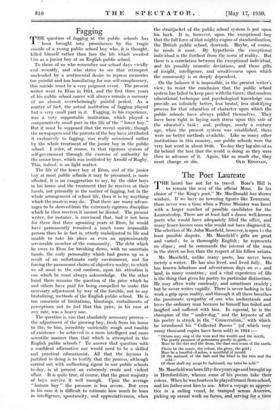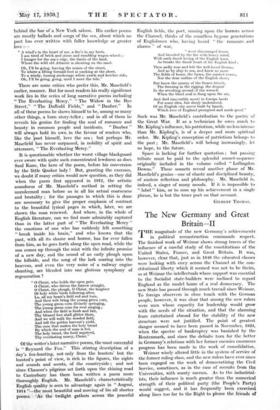The Poet Laureate
THE laurel has not far to travel. Boar's Hill is to remain the seat of the official Muse. In his choice of " the King's poet," Mr. MacDonald has shown wisdom. If we have no towering figures like Tennyson, there never was a time when a Prime Minister was faced with a larger number of possible candidates for the Laureateship. There are at least half a dozen well-known poets who would have adequately filled the office, and many lesser-known ones who would not have disgraced it. The selection of Mr. John Masefield, however, is open .0 the least possible dispute. Mr. Masefield's gifts are great and varied ; he is thoroughly English ; he represents no clique ; and he commands the interest of the man in the street no less than the respect of his fellow artists.
Mr. Masefield, unlike many poets, has never been merely a writer. He has also lived, and lived fully. He has known laborious and adventurous days on se_i and land, in many countries ; and a vital experience of life is the thing that gives his poetry its particular distinction. He may often write carelessly, and sometimes crudely ; but he never writes vapidly. There is never lacking in his work a grip upon reality, and through it all there breathes the passionate sympathy of one who understands and loves the ordinary man because he himself has toiled and laughed and suffered with him. In especial, he is the champion of the " under-dog," and the keynote of all his poetry is struck in the " Consecration," with which he introduced his " Collected Poems " (of which very many thousand copies have been sold) in 1924 :- " Others may sing of the wine and the wealth and the mirth, The portly presence of potentates goodly in girth,— Mine be the dirt and the dross, the dust and scum of the earth4 Theirs be the music, the colour, the glory, the gold ;
Mine be a handful of ashes, a mouthful of mould.
Of the maimed, of the halt and the blind in the rain and 'the cold Of these shall my songs be fashioned, my tales be told."
Mr. Masefield was born fifty-five years ago and brought up in Herefordshire, whence some of his poems take their colour. When he was fourteen he played truant from school, and his father sent him to sea. After a voyage as appren. tice in a sailing vessel, he tramped across America, picking up casual work on farms, and serving for a time behind the bar of a New York saloon. His earlier poems ' are mostly ballads and songs of the sea, about which no poet has ever iyritten with fuller knowledge or greater love :-
" A wind's in the heart of me, a fire's in my heels. I am tired of brick and stone and rumbling wagon-wheels ; I hunger for the sea's edge, the limits of the land, Where the wild old Atlantic is shouting on the sand.
Oh, I'll be going, leaving the noises of the street, To where a lifting foresail-foot is yanking at the sheet, To a windy, tossing anchorage where yawls and ketches ride, Oh, I'll be going, going, until I meet the tide."
There are some critics who prefer this, Mr. Masefield's earlier, manner. But for most readers his really significant work lies in the series of long narrative poems including " The Everlasting Mercy," " The Widow in the Bye Street," " The Daffodil Fields," and " Dauber." In all of these poems he shows himself to be, among so many other things, a born story-teller ; and in all of them he reveals his genius for finding the soul of romance and beauty in common people and incidents. " Dauber " will always hold its own in the favour of readers who, like the poet himself, love the sea ; but perhaps Mr. Masefield has never surpassed, in nobility of spirit and utterance, " The Everlasting Mercy."
It is questionable whether the worst village blackguard ever swore with quite such concentrated lewdness as does Saul Kane, the hero of the poem, before his conversion by the little Quaker lady 1 But, granting the excesses, we doubt if many critics would now question, as they did when the poem first appeared in 1912, the artistic soundness of Mr. Masefield's method in setting the unredeemed man before us in all his actual coarseness and brutality ; for the passages in which this is done are necessary to give the proper emphasis of contrast to the beautiful lyrical pages in which, later, we are shown the man renewed. And where, in the whole of English literature, can we find more admirably captured than in the latter part of " The Everlasting Mercy " the emotions of one who has suddenly felt something "break inside his brain," and who knows that the past, with all its shame and horror, has for ever fallen from him, as he goes forth along the open road, while the sun comes up through the mist with the infinite promise of a new day, and the sound of an early plough upon the hillside, and the song of the lark soaring into the heavens, and even the very noise of a railway engine shunting, are blended into one glorious symphony of regeneration ?
" 0 Christ, who holds the open gate,
O Christ, who drives the furrow straight, O Christ, the plough, 0 Christ, the laughter Of holy white birds following after, Lo, all my heart's field red and torn, And thou wilt bring the young green corn, The young green corn divinely springing, The young green corn for ever singing ; And when the field is fresh and fair, Thy blessed feet shall glitter there, And we will walk the weeded field, And tell the golden harvest's yield, The corn that makes the holy bread By which the soul of man is fed, The holy bread, the food unpriced, Thy everlasting mercy, Christ."
Of the writer's later narrative poems, the most successful is " Iteynard the Fox." This stirring description of a day's fox-hunting, not only from the hunters' but the hunted's point of view, is rich in the figures, the sights and sounds and scents, of the countryside ; and not since Chaucer's pilgrims set forth upon the shining road to Canterbury has there been written a poem more thoroughly English. Mr. Masefield's characteristically English quality is seen to advantage again in " August, 1914 "—the most beautiful and moving of his all shorter poems. As the twilight gathers across the peaceful English fields, the poet, musing upon the horrors across the Channel, thinks of the countless bygone generations of Englishmen who, having heard " the rumours and alarms " of war,
" went discouraged home, And brooded by the fire with heavy mind, With such dumb loving of the English loam As breaks the dumb heart of the English kind ; Then sadly rose and left the well-loved Downs, And so by ship to sea, and knew no more The fields of home, the byres, the market-towns, Nor the dear outline of the English shore, But knew the misery of the frozen trench, The freezing in the rigging, the despair In the revolting second of the wrench When the blind soul is flung upon the air, And died (uncouthly most) in foreign lands For some idea, but dimly understood, Of an English city never built by hands, Which love of England prompted and made good."
Such was Mr. Masefield's contribution to the poetry of the Great War. If as a technician he owes much to Mr. Kipling's influence, his patriotism, while no less intense than Mr. Kipling's, is of a deeper and more spiritual order. Mr. Kipling's conception of patriotism belongs to the past ; Mr. Masefield's will belong increasingly, let us hope, to the future.
Space is lacking for further quotation ; but passing tribute must be paid to the splendid sonnet-sequence originally included in the volume called " Lollingdon Downs." These sonnets reveal another phase of Mr. Masefield's genius—one of chaste and disciplined beauty, of austere reflection and philosophy. Mr. Masefield is, indeed, a singer of many moods. If it is impossible to " label " him, or to sum up his achievement in a single phrase, he is but the truer poet on that account.
GILBERT THOMAS.















































 Previous page
Previous page